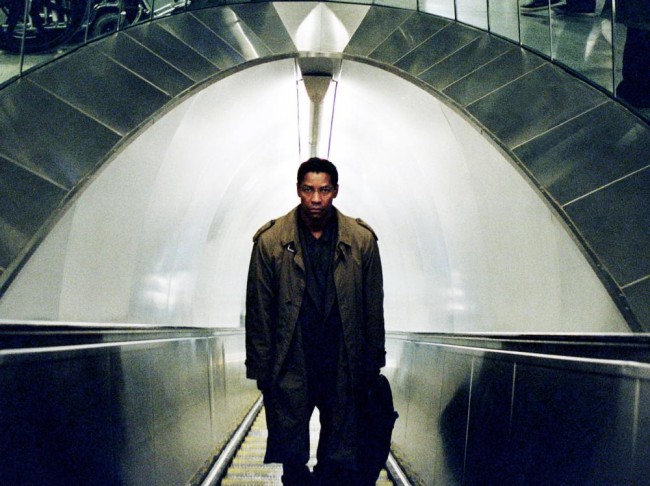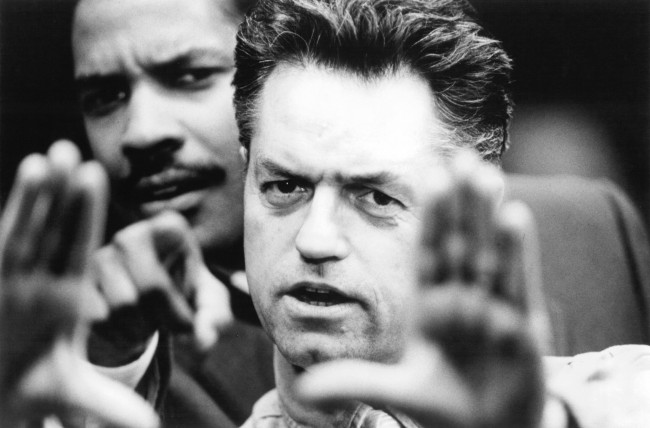

By Ray Pride Pride@moviecitynews.com
Jonathan Demme in the Modern World: On MANCHURIAN CANDIDATE (2004)
 Unlike his actors, Demme saw John Frankenheimer’s film on its first release. “I saw the original when I was a teenager,” he tells me. “I was an avid moviegoer, I saw everything,” he says, hardly taking a breath.
Unlike his actors, Demme saw John Frankenheimer’s film on its first release. “I saw the original when I was a teenager,” he tells me. “I was an avid moviegoer, I saw everything,” he says, hardly taking a breath.
DEMME: Everything, everything. I was really hooked on movies at a very young age. The Manchurian Candidate, along with Seven Days in May, Fail-Safe and Dr. Strangelove [were] this quartet of anarchistic black-and-white American movies, each of which did things that you just didn’t do in American movies, especially in the realm of irreverence toward politics and government institutions and the Army. I was what, 16, it was shocking, it was thrilling and interestingly, it predated my exposure to the French New Wave, so in away, this was the American, a certain kind of new wave in American movies. So Manchurian Candidate was a trailblazer, it was a shocker, it was a great picture and it altered the way I thought about movies! [Demme caps the rush of words with a pleased whooshing sound.]
You’d done one remake before, The Truth About Charlie, the 2002 remake of Charade. Why another?
One day, I get a call from my agent and he says, ‘So, Jonathan, there’s a script that Denzel’s attached to, it’s a go at Paramount, and they want you to read it.’ And I was like, ‘Oh my god, Denzel again, my dream come true. What is it?’ ‘It’s a remake of The Manchurian Candidate.’ ‘Oh my God! No, no!’ Frankly, I was amazed that would come to me, me in particular, to remake a classic.
So remakes —
I don’t think it’s sacrilegious to remake any movie, including a good or even great movie. I think what’s sacrilegious is to make a bad movie, whether it’s a remake or an original. It’s what I always tell my actor friends, anybody who’s in this, this [business], you’ve gotta try to hold out and only do the scripts, do the material that offers you the opportunity to do your best work. Because if you do stuff that doesn’t give you that opportunity? Your work’s not gonna be good. And you’re gonna suffer in the long run from that. So I don’t care if it’s a remake if it’s a great script with parts in it that can attract fantastic actors, God, you know, to make the movie.
 Can you define what went wrong with The Truth About Charlie? Marketing?
Can you define what went wrong with The Truth About Charlie? Marketing?
Oh, well. At the end of it, my own personal taste, I think Truth about Charlie is a real fun picture and I think it has a lot to offer. I think it’s, it’s limited, it’s not what it was meant to be, it’s not the kind of sparkly movie it was supposed to be when Will Smith was gonna play the lead. Mark Wahlberg, who has, y’know, very real gifts in his own right, doesn’t have the same gifts as Will. So, in casting Mark in order to get the picture made, it turned it into a different kind of picture than it was conceived as. And, and I think, y’know, that was not helpful. Then it came out, and even though it got a lot of good reviews, real good reviews, Universal did dump it because it opened, it had a bad Friday night, and they pulled the advertising out. Didn’t go with quote ads. I don’t know if it would have done better, what have you, but anyway, it certainly didn’t suggest that I was the go-to guy to remake classics. It was kind of curiously stimulating to me; I was like, ‘Really?’ So anyway, I read the script, and I thought the script was great. That, coupled with Denzel, I didn’t think about it at all.
There’s a running buzz of news reports and other media that makes it seem like Washington’s increasingly unhinged character has an infernal radio in his head that will not shut off. The device makes the satire even denser, with news reports about war “contractors” and touch-screen voting machine fraud. Was this added late in the game?
Some stuff was added late in the game. But I gotta tell you, the missing person, y’know, at this table, either to take lumps or to be congratulated, because he did a good job, is Dan Pyne. Who wrote the script. And who really, really, really knows his stuff and who y’know, in that, in that opening sequence, he had a civilian contractor, and this was before civilian contractors started making the news. And it’s even before multinational corporations that profit from war made the news to the extent that they started making the news. We’re reading a lot about companies like Halliburton and the Carlyle group and what have you, but, but when Dan wrote the script, the companies were in existence but they didn’t have the kind of profile that they have now.
While we were editing, even when Abu Ghraib happened, we go into the cutting room, and we’ve got our guys who’ve been all drugged up and being forced to do terrible things to each other and stuff and it was, it was arguable that we wound up with not quite the fantasy movie that we started out to make. A kind of escapist, cautionary tale. It just seemed to take on added resonance as events have gone down.
The incessant rush of voiceovers is a nifty narrative shortcut.
I’m fascinated to note to what extent, if at all, people even listen to the news broadcasts that Marco is being assaulted by all the time. I feel that’s the kind of world we live in today and to not have that going on would be inauthentic and it would also be a betrayal of the whole, the whole sort of Richard Condon theme of media-ization of politics and the politicization of the media. That whole thing.
It was fun and exciting and challenging to try. Some folks will be listening, and that will unfold in a good way. There’s something disturbing about what we hear [on the soundtrack] when we hear it. It keeps our themes alive. I also was excited about using that as a way to bring Manchurian Global’s presence in the movie more than having to cut to the bad guys in the boardroom or cut to people talking about them a lot. Just like, let them seep into the news the way Halliburton, for example, the Carlyle Group has been seeping into the news and seeping into Marco’s consciousness. Marco, at a certain moment, when, when one particular report helps him click into his latest paranoid fantasy about what’s happening, [a pivotal character] dies, and that newscast of the news of his death is followed by new allegations against Manchurian Global and it clicks for him.
One of the news reports that I like a lot is when we hear about protests at a dinner honoring the CEO of Votron, the manufacturers of new, touch-screen voting, controversial new touch-screen voting machines, because, as we know, y’know, like with an eye on Florida and what happened four years ago and now they’re letting those machines that actually tally minus 12,00 votes for Gore in Florida, now are going to be in other states, too? And what? They’re all owned by people who are big contributors to the Republican Party? Well, that’s not what our movie’s about, but texturally, texture, let’s remind people that there’s a controversy out there, let’s push that button. And y’know, we have, anyway. We were constantly refining [the soundtrack] and updating that and trying to make the picture as connected as possible tot the endless myriad of issues that are involved with the election at the moment.
So, two movies in one year. That’s productive.
It’s an interesting coincidence because The Agronomist was a decades-long endeavor, kind of stopping, on-and-off again thing and then came together. The other thing that’s interesting is, for me [laughs], if not for anybody else, but the documentary’s about a real, live person who was assassinated. And in the fictional movie, there’s an assassination attempt. And I tried to find like a parallel but there isn’t. It’s a bizarre coincidence.
[Condensed from a longer feature.]














